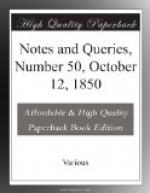Bilderdijk the Poet.—Banished from his native country, disowned by his own countrymen, the Dutch poet Willem Bilderdijk pitched his tent for a while on the hospitable soil of Old England. Prince William V. residing in 1795 at Hampton Court, he resolved to stay there; but, possessing no income at all, and, like the sage of antiquity, having saved nothing from the shipwreck but his genius, he shifted his dwelling-place to London, where he gave lessons in drawing, languages, and various, even medical, sciences. He was married in England to Katharine Wilhelmina Schweickhardt, on the 18th of May, 1797. His residence in the birthplace of “NOTES AND QUERIES” makes me ask, if there be still persons living, who remember him as teacher, friend, or poet? A presentation-copy of Mrs. Bilderdijk’s translation of Rodrick, the Last of the Goths, was offered to Southey, accompanied by a Latin letter from her spouse. The poet-laureate visiting Leyden in the summer of 1825, Bilderdijk would not suffer him to remain lodged in the inn, where an injury to his leg urged him to favour the landlord with a protracted stay. Southey was transported accordingly to the Dutch poet’s house; and did not leave it before he was cured, several weeks having elapsed in the meanwhile. Mention of this fact is made in a poem the British bard addresses to Cuninghame. I do not know whether it is alluded to in Southey’s Life.
Bilderdijk’s foot was crushed accidentally, in the sixth year of his age, by one of his play-fellows; and thus he, who, by his natural disposition seemed to be destined to a military career, was obliged to enlist in the militia togata. He fought the good fight in verse. It is remarkable that Byron and Sir Walter Scott, his cotemporaries, were also lame or limping.
JANUS DOUSA.
Egyptian MSS.—What is the age of the oldest MS. found in Egypt? Are there any earlier than the age of Alexander?
J.A. GILES.
Scandinavian Priesthood.—Will one of your correspondents do me the favour to let me know the best authority I can refer to for information as to the priesthood of the Scandinavians; the mode of their election, the rank from which they were generally chosen, whether they were allowed to marry, &c.?
MAX BRANDESON.
Thomas Volusemus (or Wilson?).—Is anything known of Thomas Volusemus (Wilson?) who edited the works of his father-in-law, Patrick Adamson, titular Archbishop of St. Andrew’s, which were published in London A.D. 1619?
H.A.E.
* * * * *
REPLIES.
CURFEW.
We have received the following Replies to NABOC’S inquiry (Vol. ii., p. 103.) as to where the custom of ringing the curfew still remains.
Bingley in Yorkshire.—In the town of Bingley, {312} in Yorkshire, the custom of ringing the curfew existed in the year 1824. It may have been discontinued since that year, but I do not know that it has.




